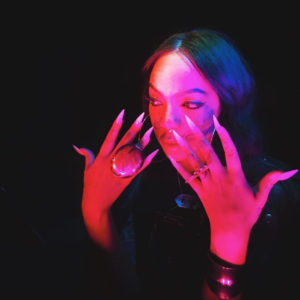While presenting the award for outstanding British film at last year’s Baftas, Emma Watson made clear that, unlike J.K. Rowling, she was “here for all of the witches”. Her purpose was twofold: to broadcast her moral superiority to the author-turned-alleged-enemy-of-the-trans-community, and to signal her allegiance to a modern, edgy feminism — all witches welcome! — which leaves no one behind.
Despite being marginalised crones on the fringes of society, witches are having a moment. For several years, we’ve been hearing of their resurgence as “a symbol of feminist empowerment”. From young women casting spells against Donald Trump to British Vogue producing a “Guide to Being a Modern Witch”, now is the time for us to wield our wands against the patriarchy — or, failing that, a beleaguered female author will do. And 2023, we are told, is set to be the Year of “Witch Lit”, with novels such as Emilia Hart’s Weyward and Margaret Meyer’s The Witching Tide hitting the shelves.
In many ways, I am in favour of this. Not only am I a huge fan of dark stories about powerful women, but my own forthcoming non-fiction book, exploring the demonisation of middle-aged women, bears the title Hags. The witch has long been an important figure for feminists, capturing the relationship between women’s vilification, our otherness, and our strength. In the words of Kristen J. Sollée, author of Witches, Sluts, Feminists, she’s “a martyr mascot for the women’s movement”.
And yet, I’m not convinced by some of the qualities — moral purity, stylised rebellion — that seem most important to some of those who champion her today. Real witches don’t win the applause of Bafta audiences. Women who are truly hated, truly marginalised, might be role models in the sense that they teach us what it means to be an outsider, but they are not aspirational. In Women & Power, Mary Beard argues that fetishising the female monster is a poor substitute for challenging the forces that keep her in place: “despite the well-known feminist attempts over the last 50 years or more to reclaim Medusa for female power (‘laughing with Medusa’, as the title of one recent collection of essays put it) — not to mention the use of her as the Versace logo — it has not made a blind bit of difference to the way she has been used in attacks on female politicians”.
In my own writing, I am more interested in looking at the dynamics of misogyny, witch-hunting and demonisation than in “reclaiming” witch as an identity open to all. I just don’t think it works that way. What worries me about treating the witch as “one of us” — someone on our side, representative of our values, proof of our anti-establishment credentials — is that it prizes the external trappings of “witchiness” over a meaningful analysis of what might make a woman a witch today. At its extreme, the former becomes a substitute for the latter.
Through the witch — in fiction and fashion — you can engage in a kind of fantasy feminism, role-playing standing up to the mob. In this sense, “Witch Lit” corresponds to a psychological need that cannot be met in the real world, where fear of rejection and ostracism tempers rebellious urges. By making it fashionable to immerse yourself in stories where women go against social norms, becoming ugly, aggressive and dangerous, you create a paradox: a woman can use the witch not as provocation, but to signal her conformity. It’s a way of ticking off feminism’s “bad woman” objective without inconveniencing others, the literary woman’s equivalent of wearing a Girls Just Want To Have Fun(damental Rights) t-shirt.
It’s not that I don’t think fiction writers are producing some wonderful, highly intelligent work on the topic of witches and witch hunts. My issue is with where it sits in the context of feminism and publishing at this particular point in time. For instance, Kiran Millwood Hargrave’s The Mercies is a brilliant study of the way in which a self-sufficient, female-centred community is rendered sinister under patriarchy’s gaze, with members eventually turning on its most outspoken member as a way to save themselves. It’s based on events on the Norwegian island of Vardø in the early 1600s. Nonetheless, the Guardian describes it as “a witch-hunt tale for our times”.
One of the most striking scenes involves the main protagonist, Maren, feeling compelled to participate in the condemnation of a woman who has been her friend: “Maren watches as the word [witch] ripples around the assembled women like a current… She watches, betrayal thumping its drum in her chest as Kirsten is bound at the wrists and led in the direction of Vardøhus.” Reading it, one feels dismay at Maren’s betrayal, but also senses that, in her place, we’d have done the same. It’s testimony to Hargrave’s skill and empathy as a writer that she doesn’t go down the easy route of focusing on heroic victimhood. She makes you understand the compromises. It is, absolutely, relevant to our times, if perhaps in more ways than the Guardian may have considered.
There are many behaviours I notice, in both feminism and publishing, which replicate the dynamics of the witch hunt. Accuse a woman — older, outspoken, perhaps too independent for your liking — of a ludicrous crime, such as causing crops to fail, bewitching your cattle, wanting to commit genocide or denying your right to exist. Vilify women who congregate without the presence of male guardians. Subject these women to punishments which rely on spectacle, then trust that the punishment itself will convince others of the validity of the original accusation. Create a climate of fear, so that other women will be afraid to assert themselves, perhaps even encouraged to point the finger at others to deflect attention from themselves.
In 2020, the year The Mercies was published, Hargrave refused to sit on a judging panel for Mslexia until the older novelist Amanda Craig stepped down. This was because Craig had signed an open letter in support of J.K. Rowling, who was receiving a torrent of death and rape threats — punishment as spectacle — for having had the temerity to express her own views on sex and gender. Rowling was being accused, ludicrously, of wanting others dead, and Craig, for standing by her, was tainted, too. Having read her novel, I was shocked by Hargrave’s behaviour: it seemed like such a crass replication of the very finger-pointing she’d depicted so well. The younger woman directs the mob towards the older one, like Abigail Williams in Salem, like Jennet Device in Pendle. Like, eventually, Emma Watson in front of the Bafta crowd.
It was as though because Hargrave had “done” the politics of the witch hunt in fiction, she didn’t need to engage with it in real life. I’m not suggesting that every author has to better the choices made by their own creations, or that they should share the beliefs of J.K. Rowling. But if part of a book’s marketing relies on its moral import and relevance to modern-day feminism, then I think we need to question how far novels which deal with witchcraft and/or female persecution represent an extension of feminist activism — or merely a substitute for it. I’ve nothing against people immersing themselves in stories of “marginalised women with hidden powers, the kind of female traditionally hunted down or isolated”. It should not, however, become a kind of wish fulfilment, a way of easing the conscience, or not having to face it at all.
The witch is not a cool figure. No one gets burned at the stake for being too cool. Once you start claiming you’re here for “all of the witches”, the truth is, you’re here for the mob.
Disclaimer
Some of the posts we share are controversial and we do not necessarily agree with them in the whole extend. Sometimes we agree with the content or part of it but we do not agree with the narration or language. Nevertheless we find them somehow interesting, valuable and/or informative or we share them, because we strongly believe in freedom of speech, free press and journalism. We strongly encourage you to have a critical approach to all the content, do your own research and analysis to build your own opinion.
We would be glad to have your feedback.
Source: UnHerd Read the original article here: https://unherd.com/



